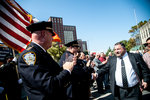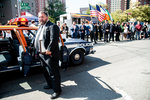A few of our stories and columns are now in front of the paywall. We at The Chief-Leader remain committed to independent reporting on labor and civil service. It's been our mission since 1897. You can have a hand in ensuring that our reporting remains relevant in the decades to come. Consider supporting The Chief, which you can do for as little as $3.20 a month.


Much has changed since Frank Ciccone joined the ranks of what was then the New York City Housing Authority Police Department. Call them the bad old days.
Despite recent headlines suggesting otherwise, violent crime citywide has plummeted since Ciccone, then 23, joined the Housing Police in 1982, patrolling Brownsville and East New York, where he also handled anti-crime assignments.
There were 1,668 murders, for instance, that year, or more than three times the 488 who were killed last year. Within a few years, in 1990, there were 2,245 homicides citywide.
It was a different time. Ciccone grew to like the gig.
Within a few years, he transferred to the Housing Police’s Detective Bureau. He then was assigned to the 73rd Precinct's Robbery Identification Unit, one of just six Housing Police officers on a citywide robbery squad. He was promoted to detective in 1988, played significant roles within his union, mobilized on active duty with the U.S. Navy following the Sept. 11 terror attacks, and served as treasurer and secretary of the NYPD Honor Legion, the department’s oldest fraternal organization.
He also did police work, lots of it.
Detective Frank Ciccone squeezed out all the time he could from The Job. On Monday — a day before he turned 63, the NYPD’s mandatory retirement age, and after 40 years after joining city police — Ciccone turned in his badge and gun, walked out of the 60th Precinct and saluted his colleagues.
‘I didn’t hate the job’
Like many of his fellow cops, Ciccone considered a city job a relatively safe, secure and, ultimately, gainful career path. “It was a good, secure job, a paycheck every week,” he said.
He took multiple entrance exams, and first landed with the Department of Correction, working as an officer on Rikers Island. “They called first, and that’s where I went,” he said during an interview last week.
But his tenure at what was then called C-95, since renamed the Anna M. Kross Center, Rikers’ largest jail, was short.
Owing to a phone call from the Housing Police, his time on the penal colony was brief. Among the enticements were the Housing Police’s 20-year pension plan, which wasn’t yet on the books at DOC. “It was a no-brainer where you wanted to go work,” Ciccone said.
He stayed twice as long as he needed to. “I enjoyed it. I was a detective. It was gratifying work,” he said.
There was always the satisfaction of a successful resolution, whether that involved finding a missing kid, or making an arrest on a homicide. “It worked for me, the job,” he said. The hours, he said, were flexible, and tours could be exchanged, which gave him time and opportunity to go watch his two kids when they had a ballgame.
“There’s not many jobs where you can change your tour from a day tour to a 4-to-12 to accommodate some of those schedules. “And I didn't hate the job, so I stayed.”
And he will be missed.
“When we talk about ’The Greatest Detectives in the World,’ it’s dedicated 40-year veterans like Frank Ciccone who come to mind,” said Paul DiGiacomo, the president of the Detectives’ Endowment Association. His fellow detective carved “a tremendous legacy,” DiGiacomo said.
“Frank is the kind of detective that Hollywood makes movies about — tough, unshakeable crime fighters who have seen it all, and still have a heart of gold.”
Ciccone, elected DEA delegate for the 60th Precinct’s Detectives Squad in 1998, had been a full-time union officer since 2018, handling NYPD and Civilian Complaint Review Board hearings and other matters.
‘Under great scrutiny’
Ciccone reflected frankly about his four decades as a city cop. He said the nature of police work, and how police work is viewed — and understood, however unjustifiably — changed greatly as technology became more ubiquitous. But tech’s prevalence has also posed challenges, even obstacles, he said.
Phones, GPS technology, body-worn cameras all contribute to case evidence, but they also demand a detective’s time — to retrieve, access, process, subpoena, present and prosecute.
“Every case that you get in the detective squad right now takes time,” he said. “And they're asking more of the detectives to do more than ever.”
And there are now fewer of them. Retirements and resignations among uniformed officers have spiked this year. Nearly 400 detectives alone have left the department so far this year, according to the DEA’s DiGiacomo.
Detectives these days are investigating between 300 and 500 cases, the union leader said recently. DiGiacomo said that another 500 or so detectives are needed to bring caseloads to manageable levels.
For now, the burden has increased significantly, Ciccone said. “The manpower shortage is just unbelievable at this point. And it's very difficult to work under those circumstances,” he said.
On the one hand, detectives have the tools to gather increasing amounts of possible evidence to help pinpoint a suspect or close out a case, but it's way more time consuming. But that very technology, for good or ill, and often both, engenders a dissection of police work that wasn’t present before.
“You're under great scrutiny from the department, from the public,” Ciccone said. “That's very stressful, especially from a guy like myself, who came on when you didn't have all those things, and now you transition to this. That's a big change.”
And that’s all brought the tactical side of policing closer to the public eye, with incidents between officers and suspects, and even the public, increasingly dissected, the deaths of Eric Garner, on Staten Island, and of George Floyd, in Minneapolis, among the most notorious.
That in turn has brought about legislation at the state and city level intended to safeguard the public, but which police and their backers view as hindering cops, notably looser bail laws and the city’s diaphragm bill, which forbids officers from using certain restraint techniques when subduing a suspect.
‘A lot of things have changed’
The NYPD and its officers, he said, are the most scrutinized in the country, but few lawmakers have taken the time and made the effort to understand the nature of police work. “Cops,” Ciccone said, “ are just very reluctant to do things.… And it doesn't do the people of the city any good when cops are afraid to do their jobs.”
Nonetheless, he’s retained positives from his time with the NYPD and the Housing Police before that. “Listen, it's a job where you're not stuck behind a desk. Every day is different,” he said.
But he added, the obstacles remain many in a department beset by recruitment and morale difficulties. “Every day is a new challenge to you. But the new guys, their challenges are much different than mine…. A lot of things have changed. Like I said, some for the better, others not so good.”
His advice to the new guys?
“Take one day at a time. Anybody who tells you that they know everything, knows nothing. And learn every day from somebody,” Ciccone said.
And be on the lookout for the shock of the new. Because, like throughout his own 40-year span, the city will soon be a different one than it is today.
“You have to be willing to learn and change as things go on, otherwise you won't succeed,” he said. “Years ago, you had the three-card monte guys all over the place. You don't see them anymore. But if you try to tell a new guy about it, he's going to look at you like you're crazy.”
richardk@thechiefleader.com
Comments
No comments on this item Please log in to comment by clicking here